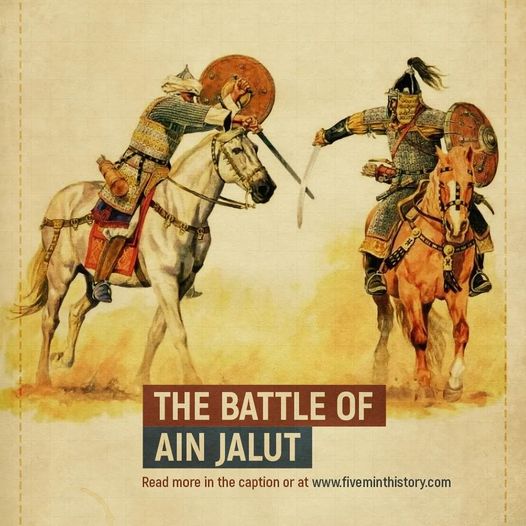On the 26th (or 25th) of Ramadan in 658 Hijri (September 3, 1260), the Mamluks of Egypt defeated the Ilkhanid (Mongol) forces of Hulagu Khan under Kitbuga at the Battle of Ain Jalut. Kitbuga was the lieutenant of Hulagu Khan who had assisted him during the Mongol invasion of the Middle East.
Shortly before the battle, Hulagu withdrew from the Levant and left Kitbuga there. The victory was sealed when Kitbuga was captured and executed by the Mamluks. This caused the remaining Mongols to retreat.
With their victory over the Ilkhanate, the Mamluks under the command of Sultan Saif al-Din Qutuz and Rukn al-Din Baibars halted the Mongol invasion. The Battle of Ain Jalut has been represented by numerous academic and popular historians as an epochal battle.
Previously in 1243, the Mongols had defeated the Seljuks of Rum and forced them to recognize the Mongol Great Han as suzerain. After a temporary retreat in 1252, the Mongol commander Hulagu returned to take Iraq, ravaging Baghdad and killing the last Abbasid caliph (1258) before going on into Syria.
The Mongols finally arrived at Aleppo in December 1259. On January 18, 1260, they started the Siege of Aleppo. The city surrendered on January 24, 1260, after only 6 days. The massacre of the Muslims and Jews in Aleppo lasted for six days. On March 1, 1260, Damascus also fell to the Mongols.
In response to the Mongol threat, Egypt fell under the Mamluk slave dynasty (1250-1517), which defeated Hulagu’s garrisons at Ain Jalut (1260) and in Syria and Palestine, thus halting the high point of Mongol expansion but leaving them in control of the rest of the Middle East.
In 1308, the Seljuq Sultan Mesud II was murdered and thus the Seljuqs of Anatolia were overthrown by the Mongol Ilkhanate completely. But soon in 1335, the Ilkhanate was also disintegrated. After Ilkhanate’s fall, several independent petty dynasties and principalities emerged to power in Iran and Anatolia.
Join us on Telegram
https://t.me/theislamicchronicles
Support us
https://www.patreon.com/theislamicchronicles
(Copied)

